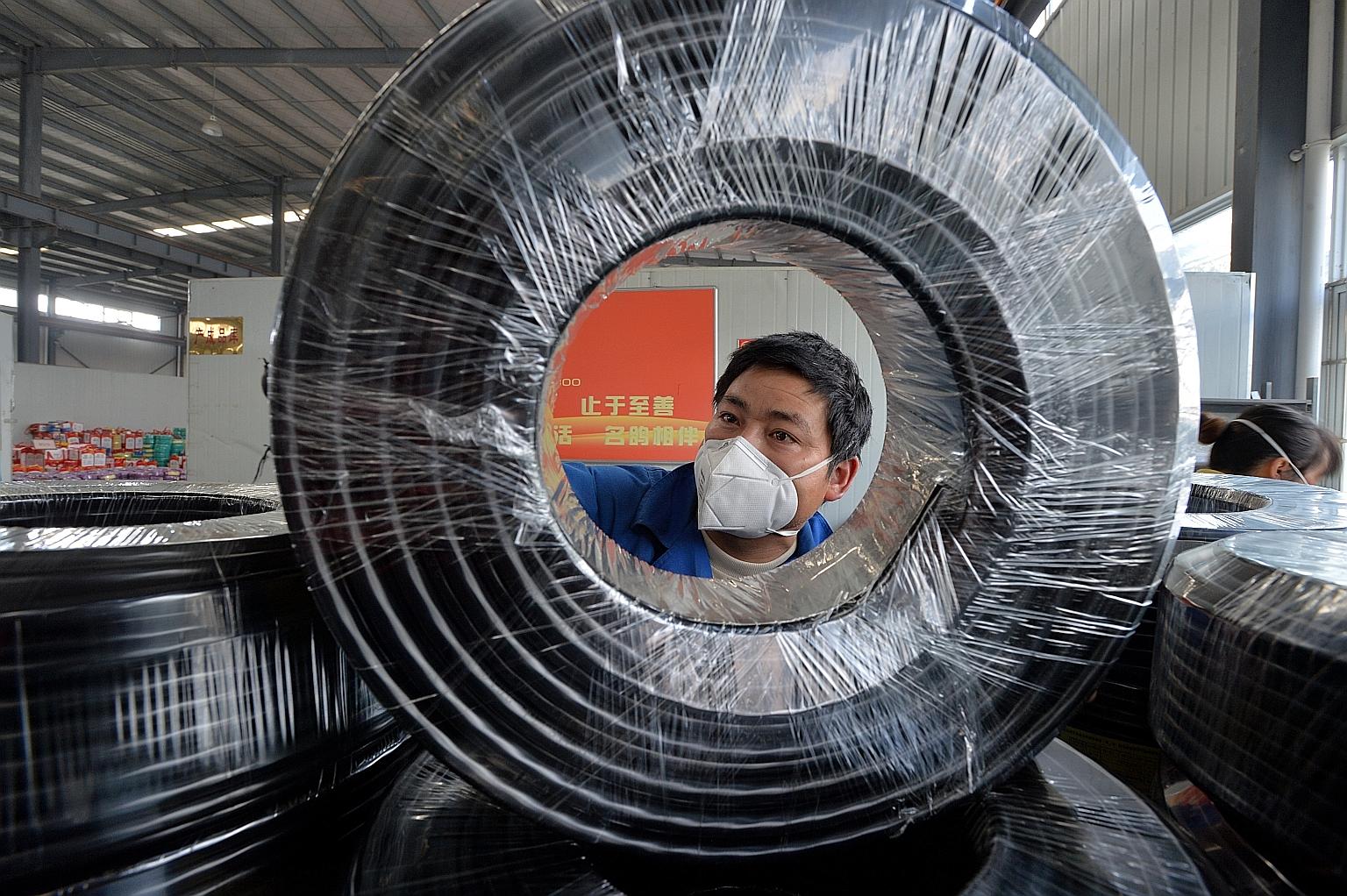Coronavirus: China's February factory activity contracts at record pace
First official snapshot of economy since outbreak well below analysts' expectations
Sign up now: Get insights on Asia's fast-moving developments

A masked worker working on a production line manufacturing cables at a factory in Guiyang, Guizhou province. The Chinese government has called on businesses to resume as soon as possible but many migrant workers have not returned to work because of the quarantine rules and travel bans.
PHOTO: REUTERS
Follow topic:
BEIJING • China's factory activity contracted at the fastest pace ever last month, even worse than during the global financial crisis, highlighting the colossal damage from the coronavirus outbreak on the world's second-largest economy.
China's official Purchasing Managers' Index (PMI) fell to a record low of 35.7 last month from 50 in January, the National Bureau of Statistics (NBS) said yesterday, well below the 50-point mark that separates monthly growth from contraction. Analysts polled by Reuters expected last month's PMI to be 46.
The sombre readings provide the first official snapshot of the Chinese economy's state since the start of the coronavirus epidemic.
The data foreshadows that the economic disruption will likely extend to the whole first quarter of this year because of widespread transport curbs and tough public health measures that have paralysed economic activity.
"We expect year-on-year growth in all activity data to be negative in January-February as China's economy has been severely constrained since Jan 23," said analysts at Nomura in a note.
Nomura now expects first-quarter growth to be 2 per cent year on year while Capital Economics estimates China's economy would contract outright in year-on-year terms this quarter, the first time since at least the 1990s.
A sub-index of manufacturing production nosedived to 27.8 last month from January's 51.3, while a reading of new orders plunged to 29.3, down from 51.4 a month earlier.
New export orders also declined at the fastest pace in years, with the NBS warning of mounting pressure on exporters from delayed shipments and cancelled orders.
Labour conditions remained tight amid travel restrictions, with a sub-reading for employment falling to 31.8 from 47.5.
Analysts are warning that the spread of the coronavirus to other countries will impact global supply chains and limit the recovery for Chinese manufacturers.
"Even if labour shortages in China start to ease, some factories may run into problems resuming normal production if outbreaks in other countries mean they have trouble sourcing intermediate goods," Mr Julian Evans-Pritchard, senior China economist at Capital Economics, said in a note on Friday.
-
35.7
China's official Purchasing Managers' Index (PMI) last month, a record low.
50
China's PMI in January.
Economists at Morgan Stanley have warned of a pronounced impact on first-quarter global growth, with rising risks of extending into the second quarter.
Beijing has rolled out support measures to help businesses, especially small enterprises that are facing a cash crunch and are key employers.
"These measures... would further boost corporate confidence and accelerate the pace of business resumption. It is expected that March PMIs would show an improvement," senior NBS statistician Zhao Qinghe said in a commentary, adding that production levels at large and medium-sized firms will rise to 90.8 per cent by end-March.
The government has called on businesses to resume as soon as possible, but many migrant workers have not returned to work because of the quarantine rules and travel bans.
China's service sector activity also contracted by the most ever, with official non-manufacturing PMI dropping to 29.6, from 54.1 in January, a separate NBS survey showed.
The sector accounts for about 60 per cent of the country's gross domestic product.
The transportation, tourism and catering sectors contracted sharply, with sub-readings below 20. A sub-index of construction activity, a key economic driver that Beijing has hoped would prop up growth, plunged to 26.6 from 59.7 in January.
The impact of the outbreak was also felt on Wall Street, where stocks suffered another downbeat session on Friday to end the worst week since the 2008 financial crisis.
The Dow Jones Industrial Average ended at 25,409.36, down 1.4 per cent, but about 725 points above its session lows. The broad-based S&P 500 shed 0.8 per cent to 2,954.22, while the tech-rich Nasdaq Composite Index ended flat at 8,567.37.
REUTERS, AGENCE FRANCE-PRESSE

